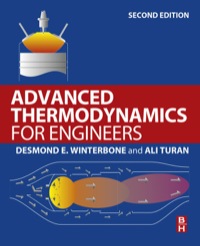A thermally isolated system at constant pressure consists of (10 mathrm{~kg}) of air at a temperature of
Question:
A thermally isolated system at constant pressure consists of \(10 \mathrm{~kg}\) of air at a temperature of \(1000 \mathrm{~K}\) and \(10 \mathrm{~kg}\) of water at \(300 \mathrm{~K}\), connected together by a reversible heat engine. What is the maximum work that can be obtained from the system as the temperatures equalise? (See P2.9, Chapter 2.)
Assume \[\begin{aligned}
& \text { for water : } \quad c_{v}=4.2 \mathrm{~kJ} / \mathrm{kg} \mathrm{K} \text {; } \\
& \kappa=c_{p} / c_{v}=1.0 \\
& \text { for air : } \quad c_{v}=0.7 \mathrm{~kJ} / \mathrm{kg} \mathrm{K} \text {; } \\
& \kappa=c_{p} / c_{v}=1.4 \end{aligned}\]
[2884.2 kJ]
Fantastic news! We've Found the answer you've been seeking!
Step by Step Answer:
Related Book For 

Advanced Thermodynamics For Engineers
ISBN: 9780080999838
2nd Edition
Authors: D. E. Winterbone, Ali Turan
Question Posted:





